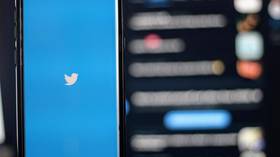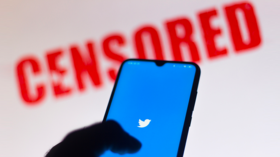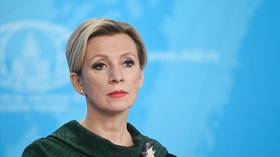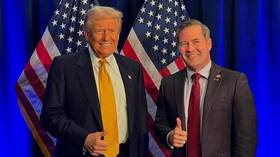Twitter announces more censorship for sake of ‘public interest’

Twitter has updated its policy on personal information to cover videos and photos of private individuals shared without their consent, unless that is done by legacy media, in “public interest,” or other context they approve of.
“Sharing personal media, such as images or videos, can potentially violate a person’s privacy, and may lead to emotional or physical harm. The misuse of private media can affect everyone, but can have a disproportionate effect on women, activists, dissidents, and members of minority communities,” Twitter’s Safety division said on Tuesday.
The company has thus decided to add “media of private individuals without the permission of the person(s) depicted” to the category of “personal information” not allowed on the platform. Addresses, identity documents, phone numbers, emails, and bank information of private individuals have already been banned under Twitter’s doxing policy.
This policy update “will allow us to take action on media that is shared without any explicit abusive content, provided it’s posted without the consent of the person depicted,” Twitter said.
It does not apply to media featuring public figures, or when media are shared “in the public interest or add value to public discourse,” however. A specific carve-out seems to be sharing images or videos of private individuals “in an effort to help someone involved in a crisis situation, such as in the aftermath of a violent event, or as part of a newsworthy event due to public interest value,” which “might outweigh the safety risks to a person.”
Twitter “will always try to assess the context in which the content is shared,” including whether it is being “covered by mainstream/traditional media” or “adds value to the public discourse, is being shared in public interest, or is relevant to the community.”
Reactions to the policy update have been mainly negative. “Twitter Implements New Rule So It Can Selectively Ban Memes, Mockery Of Democrats” is how the conservative-leaning Federalist reported the policy change.
Twitter Implements New Rule So It Can Selectively Ban Memes, Mockery Of Democratshttps://t.co/pjyScnu8ZI
— The Federalist (@FDRLST) November 30, 2021
Conservative pundit Dana Loesch said this will allow Twitter to “muzzle” independent journalists, let “corporate press” set narratives, and silence undercover reporting from the likes of Project Veritas. Independent journalist Tim Pool tweeted that “journalism is largely banned on twitter basically.”
The new rule seems “poorly thought out,” tweeted digital rights advocate Evan Greer, asking “how long before cops try to abuse this to get videos of brutality taken down?”
this seems ... poorly thought out how long before cops try to abuse this to get videos of brutality taken down? i can think of a dozen other similar abusive examples off the top of my head... i get the intention but seems like kind of a mess without more specifics https://t.co/BQqGatN4Fu
— Evan Greer (@evan_greer) November 30, 2021
As written, the update is “not only vague, but literally unenforceable,” argued BBC’s ‘disinformation’ reporter Shayan Sardarizadeh. “How do you define a private individual across different jurisdictions? What exactly is a public setting and what is in the public interest? What is traditional media? This is a minefield.”
The policy update comes less than a day after co-founder Jack Dorsey stepped down as Twitter CEO, appointing Parag Agrawal as his successor. Agrawal is best known for a November 2020 interview in which he said Twitter’s role is “not to be bound by the First Amendment.”
“So, we focused way less on what's true and what's false. We focus way more on potential for harm as a result of certain content being amplified on the platform without appropriate context,” Agrawal also said at the time.














